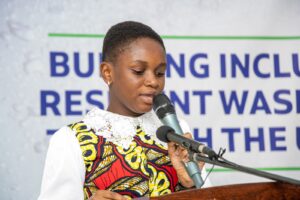
Jirapa, (UWR), Oct. 30,
Child Sanitation Diplomatic Adjoa Gyakoa Appiah-Kubi has urged adults who engaged in Open Defecation (OD) to refrain from the bad and insanitary practice, to put the nation on the edge to achieve ODF and the Sustainable Development Goals Six.
The United Nations global 6.1 and 6.2 pushes nations around the world to achieve universal and equitable access to safe and affordable drinking water as well as access adequate and equitable sanitation and hygiene for all and end open defecation, paying special attention to the needs of women and girls and those in vulnerable situations by 2030 respectively. But, just about seven years to go, Ms Adjoa Gyakoa Appiah-Kubi, the Child Sanitation Diplomat of the Coalition of NGOs in Water and Sanitation (CONIWAS), expressed worry OD continued to remain a daunting societal challenge.
She noted that children easily picked inspiration from adults, and therefore, copied their behaviours, either good or bad, blindly, saying OD was not only bad and insanitary, but a shameful practice that should not be tolerated in society. Ms Appiah-Kubi gave the advice at the opening session of the 34th Mole Water, Sanitation and Hygiene (WASH) conference, underway at Jirapa in the Upper West Region.
The CONIWAS, with support from its partners is organizing the four-day conference on the theme
“building inclusive and resilient Water, Sanitation, and Hygiene (WASH) systems to reach the unserved” and attended by about 170 participants, comprising policy makers, government actors, practitioners, Members of Parliament (MPs) as well as Municipal and District Assemblies (MDAs).Ms Appiah-Kubi said it was also imperative for MDAs to ensure that access to toilet facilities, particularly at the community levels was also not a problem, and called on the government to also equip public institutions with sanitary equipment too.
Ms Appiah-Kubi, national sanitation campaigner, also called on the CONIWAS and its partners to provide permanent platforms for children to discuss issues relating to WASH at its conferences and programmes to inspire them to participate fully in the national campaign against OD.
Ms Beata Awinpoka Akanyani, the Chairman of CONIWAS, explained the conference had witnessed consistent growth of interest and importance since it’s inception in 1989 among civil society, policy makers, local government and development partners alike. In a brief history, she explained the Mole Conference was named after the Mole Game Reserve, near Damongo in the Savannah Region, and expressed appreciation to DANIDA and the World Bank, USAID and other development partners, both local and international, for their continuous support.
Among other objectives, the conference would also discuss how the implementation of resilient WASH systems will address access and equity, and how current service delivery models will impact Ghana’s pace towards achieving WASH for all.
By: Dennis Peprah (GNA)
